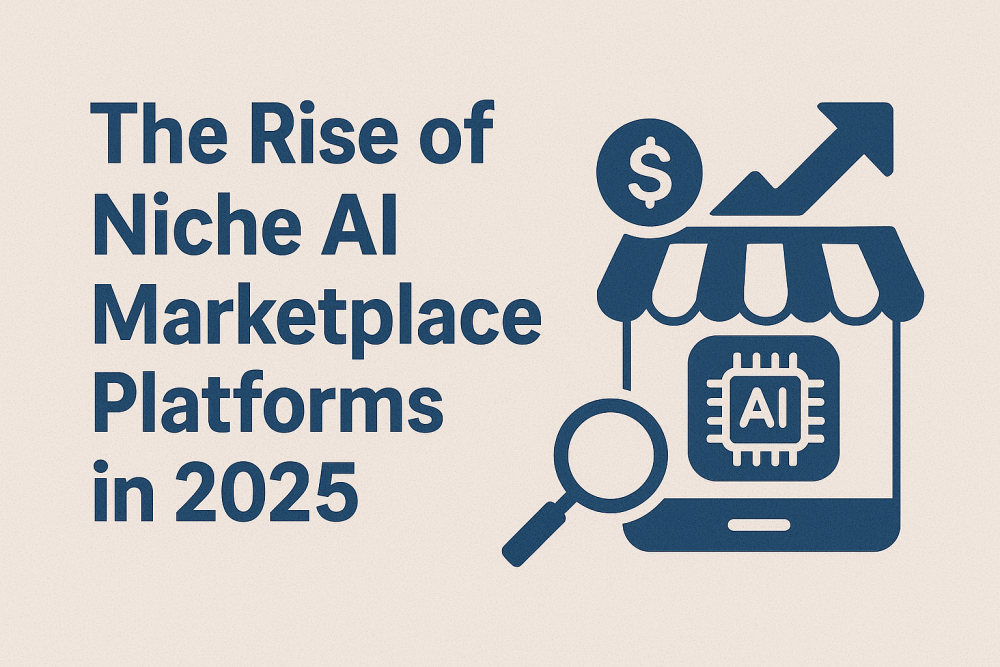To be truthful, the term “marketplace” often evokes images of Amazon or a virtual bazaar where you can purchase anything from sneakers to shower curtains. But in 2025, marketplaces are taking on a new shape, this time in the world of AI. What’s interesting is that instead of massive, generic platforms trying to be everything to everyone, we’re watching niche AI marketplace platforms steal the spotlight.
Think of them as specialized boutiques rather than giant malls. You’re not browsing aimlessly; you’re walking into a space that already knows you want a healthcare diagnostic model or a finance risk-scoring tool. It’s more personal, more efficient, and honestly, a lot smarter.
Why the Shift Toward Niche Marketplaces?
The “catch-all” AI marketplaces of a few years ago sounded great on paper. They had models for finance, healthcare, e-commerce, you name it. But here’s the catch: no one wants a “jack of all trades” model when their industry demands razor-sharp accuracy. A hospital can’t rely on a one-size-fits-all system to read X-rays, just like a hedge fund isn’t going to trust its billions to a generic algorithm.
Niche platforms step in here with depth instead of breadth. They select only what is essential for a particular field, be it medical imaging, fraud detection or tailored retail experiences. Businesses are drawn to that level of specialization because it saves time and avoids the trial-and-error chaos of testing mismatched tool
Healthcare, Finance, Retail: The Big Movers
Some of the most impressive growth in 2025 is happening in healthcare, finance, and retail. Healthcare-focused platforms are offering models designed with compliance and precision baked in, because, let’s face it, you can’t “kinda-sorta” get cancer detection right. Finance marketplaces, meanwhile, are arming banks and fintechs with fraud detection, credit scoring, and algorithmic trading models that come pre-checked for regulatory standards.
And then there’s retail. Imagine a mid-sized clothing store tapping into the same personalization tools that global giants use recommendations that actually feel like a personal shopper, not a random guess. That’s the kind of power these marketplaces are putting into the hands of businesses that couldn’t dream of building such tools themselves a few years back.
Why Businesses and Developers Love It
For businesses, niche marketplaces feel like skipping the line at the airport faster, less stressful, and more direct. Instead of burning months (and budgets) building something from scratch, they can find exactly what they need in days.
Developers, on the other hand, get to shine in front of an audience that appreciates their expertise. On big, generic platforms, a brilliant fraud detection model might get buried under cat video generators. In a niche marketplace, it gets the spotlight. That’s not just visibility but it’s credibility.
Built-In Trust and Compliance
Here’s another reason niche platforms are winning: they’re solving the compliance headache. General marketplaces often toss a model your way and say, “Good luck!” figuring out if it meets GDPR, HIPAA, or other regulations. Niche platforms are smarter about this because they build compliance into the package.
That peace of mind is priceless. No business wants to wake up to headlines about a privacy violation because they used the wrong AI tool. These platforms take some of that weight off the shoulders of already stretched IT and legal teams.
Generative AI’s Big Role
Of course, we can’t talk about AI in 2025 without mentioning generative AI. What’s interesting is how specialized platforms are customizing generative models for their sectors. In the healthcare sector, generative AI aids in creating molecules for novel medications. In gaming, it’s building immersive worlds and characters on the fly. In education, it involves creating customized lesson plans that appear designed especially for you.
Niche marketplaces can refine generative AI with precision by maintaining a narrow focus, something generalist platforms are unable to achieve.
The Not-So-Perfect Side
Let’s not idealize this excessively. Niche means smaller communities, and smaller communities sometimes mean slower growth. There’s also a risk of fragmentation, imagine having to sign up for 15 different platforms just to cover your bases.
Nevertheless, the more advanced marketplaces are proactively tackling this by forming partnerships and integrations, streamlining the navigation experience for businesses to prevent them from feeling overwhelmed by options.
What It Means for the Future
The rise of niche AI marketplaces shows how far we’ve come. AI isn’t just a shiny experiment anymore but it’s a infrastructure. And infrastructure demands precision and trust. These specialized platforms aren’t replacing the big players entirely, but they are carving out spaces where “generic AI” simply isn’t enough.
In the future, anticipate an increase in hybrid platforms that begin in one sector but link to others, such as healthcare marketplaces integrating with insurance platforms to provide comprehensive solutions. That kind of cross-pollination could open up entirely new possibilities.
Conclusion
By 2025, dedicated AI marketplace platforms are not just a trend, they indicate that the industry is progressing. They are providing tools that are more precise, secure and better suited to practical requirements. For companies, it focuses on dependability and efficiency. For developers, it’s about visibility and impact.
So, whether you’re running a hospital, a hedge fund, or an online shop, don’t be surprised if your next AI solution comes not from a massive generalist hub but from a boutique marketplace that feels like it was designed just for you. And honestly? That’s probably how it should be.
